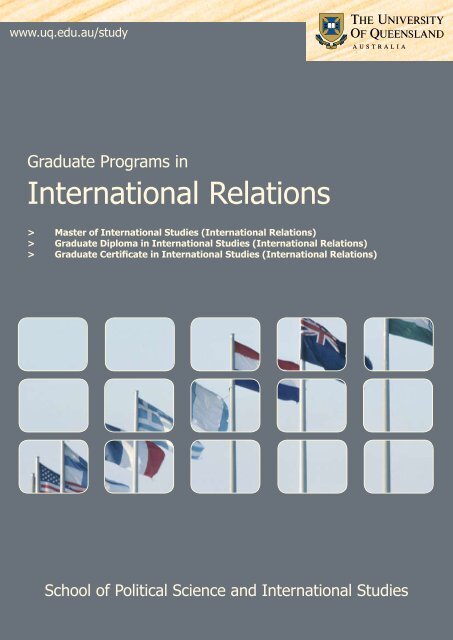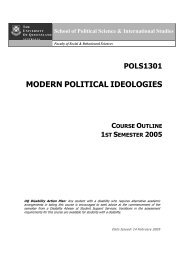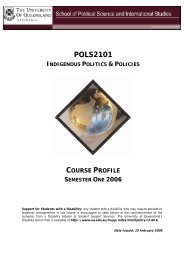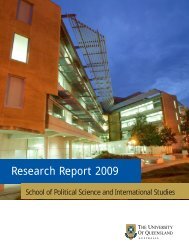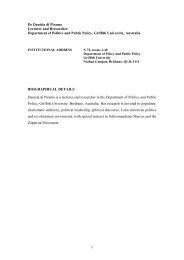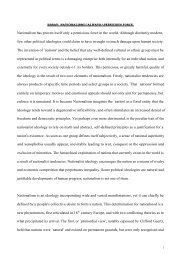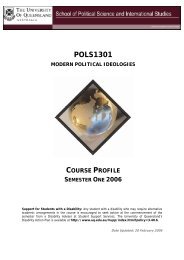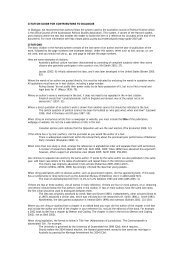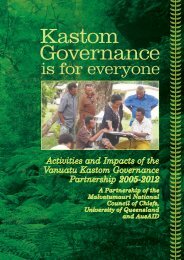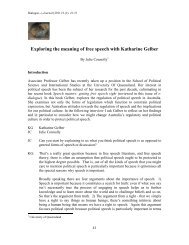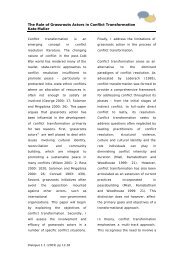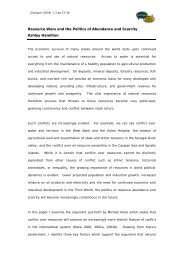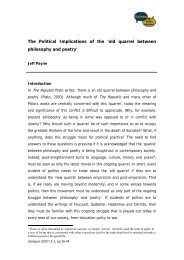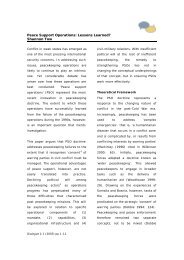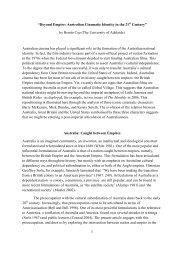International Relations - School of Political Science and ...
International Relations - School of Political Science and ...
International Relations - School of Political Science and ...
You also want an ePaper? Increase the reach of your titles
YUMPU automatically turns print PDFs into web optimized ePapers that Google loves.
www.uq.edu.au/study<br />
Graduate Programs in<br />
<strong>International</strong> <strong>Relations</strong><br />
> Master <strong>of</strong> <strong>International</strong> Studies (<strong>International</strong> <strong>Relations</strong>)<br />
> Graduate Diploma in <strong>International</strong> Studies (<strong>International</strong> <strong>Relations</strong>)<br />
> Graduate Certificate in <strong>International</strong> Studies (<strong>International</strong> <strong>Relations</strong>)<br />
<strong>School</strong> <strong>of</strong> <strong>Political</strong> <strong>Science</strong> <strong>and</strong> <strong>International</strong> Studies
<strong>International</strong> Studies<br />
(<strong>International</strong> <strong>Relations</strong>)<br />
<strong>International</strong> <strong>Relations</strong> (IR) is one <strong>of</strong> the most exciting<br />
components <strong>of</strong> political science. Increasingly, pr<strong>of</strong>essional<br />
opportunities are linked to, <strong>and</strong> pursued within, a shrinking<br />
<strong>and</strong> more complex world. Traditional dimensions <strong>of</strong> IR remain<br />
central to international peace <strong>and</strong> prosperity. These include:<br />
international diplomacy, arms control, alliance politics,<br />
institutionalism <strong>and</strong> development studies at both the regional<br />
<strong>and</strong> global levels. Newer dimensions <strong>of</strong> IR however, are also<br />
moving toward centre-stage, becoming integral components<br />
<strong>of</strong> the field. These include international political economics,<br />
environmental politics, refugee <strong>and</strong> migration problems, human<br />
rights <strong>and</strong> human security. The rapidly exp<strong>and</strong>ing <strong>and</strong> diverse<br />
array or issue-areas that can be studied under the IR rubric<br />
establishes the field as a dynamic <strong>and</strong> important part <strong>of</strong> our<br />
daily lives.<br />
The <strong>School</strong> <strong>of</strong> <strong>Political</strong> <strong>Science</strong> <strong>and</strong> <strong>International</strong> Studies at The<br />
University <strong>of</strong> Queensl<strong>and</strong> has a strong <strong>and</strong> growing research<br />
<strong>and</strong> teaching pr<strong>of</strong>ile in the field <strong>of</strong> international relations. It has<br />
close ties with several Commonwealth government agencies<br />
(including the Department <strong>of</strong> Foreign Affairs <strong>and</strong> Trade <strong>and</strong> the<br />
Department <strong>of</strong> Defence) as well as with a number <strong>of</strong> overseas<br />
institutions <strong>and</strong> research centres in Asia, Europe <strong>and</strong> North<br />
America.<br />
The programs bring together the sub-disciplines <strong>of</strong> international<br />
relations, security studies, diplomacy <strong>and</strong> political economy.<br />
These are fields <strong>of</strong> study that are <strong>of</strong>ten <strong>of</strong>fered separately.<br />
However, in an era <strong>of</strong> increasing internationalisation <strong>of</strong> political<br />
issues <strong>and</strong> the globalisation <strong>of</strong> the economy, presenting issues<br />
in strict separation risks intellectual credibility. By bringing<br />
together these various issues <strong>and</strong> streams in cohesively<br />
constructed programs, the processes <strong>of</strong> policy formulation<br />
<strong>and</strong> implementation will become more apparent to students<br />
undertaking this field <strong>of</strong> study.<br />
Employment Outcomes<br />
Qualifications in international relations can lead directly to<br />
employment in a range <strong>of</strong> positions requiring analytical expertise<br />
<strong>and</strong> sound knowledge <strong>of</strong> global issues. The postgraduate<br />
qualifications are designed to equip students with capacities<br />
relevant to careers in such areas as diplomacy, defence,<br />
journalism, intelligence <strong>and</strong> a wide variety <strong>of</strong> both government<br />
<strong>and</strong> NGO positions.<br />
Particular strengths <strong>of</strong> the program include:<br />
• Domestic students can balance their study load by<br />
selecting between one <strong>and</strong> four courses per semester.<br />
• You will study with students from a wide range <strong>of</strong><br />
countries, organisations <strong>and</strong> pr<strong>of</strong>essions.<br />
• Teaching is conducted in small groups <strong>and</strong> most classes<br />
are held in the evening.<br />
• Successful completion <strong>of</strong> the Graduate Certificate satisfies<br />
the entry requirements for the Graduate Diploma <strong>and</strong><br />
Masters degrees.<br />
• The degrees (Graduate Certificate, Graduate<br />
Diploma, <strong>and</strong> Masters) are articulated so that full credit is<br />
forwarded towards the next level <strong>of</strong> qualification.<br />
• The program incorporates an Internship/Applied Field<br />
Experience option, for which students can apply. To<br />
date, students have been placed with the United Nations<br />
High Commission for Human Rights, the United Nations<br />
High Commission for Refugees, the Centre for Applied<br />
Studies in <strong>International</strong> Negotiation in Geneva,<br />
<strong>International</strong> Alert, the Australian Red Cross <strong>and</strong> many<br />
other organisations.<br />
• Teaching staff are recognised as being world class in their<br />
respective fields. They regularly engage with national<br />
<strong>and</strong> international agencies to provide policy advice,<br />
research, consultancy <strong>and</strong> training. These agencies<br />
include Australia’s Department <strong>of</strong> Foreign Affairs <strong>and</strong><br />
Trade, various United Nations bodies, think tanks such<br />
as the Australian Strategic Policy Institute, <strong>and</strong> nongovernment<br />
agencies such as the Medical Association for<br />
the Prevention <strong>of</strong> War <strong>and</strong> Swiss Agency for <strong>International</strong><br />
Development.<br />
• Staff research has been supported by the Australian<br />
Research Council, the United States Institute <strong>of</strong> Peace,<br />
the Carnegie Foundation, the Japan Foundation, <strong>and</strong> the<br />
Humboldt Foundation.
Master <strong>of</strong> <strong>International</strong> Studies<br />
(<strong>International</strong> <strong>Relations</strong>)<br />
Entry Requirements<br />
An applicant must hold an approved degree<br />
or have successfully completed the Graduate<br />
Diploma in <strong>International</strong> Studies (<strong>International</strong><br />
<strong>Relations</strong>). The applicant must also satisfy the<br />
Executive Dean <strong>and</strong> Head <strong>of</strong> <strong>School</strong> that they<br />
are suitably qualified for admission.<br />
Program <strong>of</strong> Study<br />
Obtain credit for #24 units (a st<strong>and</strong>ard course<br />
is valued at #2 units) from the following list <strong>of</strong><br />
courses:<br />
Required courses:<br />
• Advanced <strong>International</strong> Studies #4<br />
Core courses:<br />
(#10-12 units from the list below):<br />
• Globalisation, <strong>International</strong> <strong>Political</strong><br />
Economy & Development #2<br />
• <strong>International</strong> <strong>Relations</strong> <strong>of</strong> the<br />
Asia-Pacific #2<br />
• <strong>International</strong> Security #2<br />
• Evolution <strong>of</strong> the <strong>International</strong> System #2<br />
• Foreign Policy, Diplomacy & Statecraft #2<br />
• Arms Control & Disarmament #2<br />
Elective courses:<br />
(#8-10 units from the list below):<br />
• Conflict Prevention & Resolution #2<br />
• Ethics & Human Rights #2<br />
• Contemporary Peacekeeping #2<br />
• Peacebuilding #2<br />
• Gender in <strong>International</strong> Politics &<br />
Development #2<br />
• Culture, Conflict & Reconciliation #2<br />
• Development Administration #2<br />
• Independent Study #2<br />
• Specialist Studies in <strong>International</strong><br />
Politics #2<br />
• Research Report (MIS) #6<br />
• The Politics <strong>of</strong> Development Practice #2<br />
• Research Methods #2<br />
Students may also be able to undertake an<br />
internship with an Australian government or nongovernment<br />
organisation in lieu <strong>of</strong> an elective.<br />
In addition to the listed electives, students may<br />
be able to enrol in selected courses from other<br />
<strong>School</strong>s within the University. Please consult the<br />
Program Director. These courses may include:<br />
• <strong>International</strong> Issues in Community<br />
Development #2<br />
• <strong>International</strong> Dispute Settlement #2<br />
• <strong>International</strong> Humanitarian Law #2<br />
• Mediation #2<br />
• Tolerance & Conflict in the Contemporary<br />
Middle East #2<br />
Graduate Diploma in<br />
<strong>International</strong> Studies<br />
(<strong>International</strong> <strong>Relations</strong>)<br />
Entry Requirements<br />
An applicant must hold an approved degree<br />
or have successfully completed the Graduate<br />
Certificate in <strong>International</strong> Studies (<strong>International</strong><br />
<strong>Relations</strong>). The applicant must also satisfy the<br />
Executive Dean <strong>and</strong> Head <strong>of</strong> <strong>School</strong> that they<br />
are suitably qualified for admission.<br />
Program <strong>of</strong> Study<br />
Obtain credit for #16 units (a st<strong>and</strong>ard course<br />
is valued at 2 units) from the following list <strong>of</strong><br />
courses:<br />
Required courses:<br />
• <strong>International</strong> <strong>Relations</strong> <strong>of</strong> the<br />
Asia-Pacific #2<br />
• Advanced <strong>International</strong> Studies #4<br />
• <strong>International</strong> Security #2<br />
• Evolution <strong>of</strong> the <strong>International</strong> System #2<br />
• Arms Control & Disarmament #2<br />
Elective courses:<br />
(#4 units from the list below):<br />
• Conflict Prevention & Resolution #2<br />
• Ethics & Human Rights #2<br />
• Contemporary Peacekeeping #2<br />
• Peacebuilding #2<br />
• Independent Study #2<br />
• Specialist Studies in <strong>International</strong><br />
Politics #2<br />
Graduate Certificate in<br />
<strong>International</strong> Studies<br />
(<strong>International</strong> <strong>Relations</strong>)<br />
Entry Requirements<br />
An applicant must hold an approved degree<br />
or other post-secondary studies <strong>and</strong> relevant<br />
experience may be considered in lieu <strong>of</strong> a<br />
completed degree.<br />
Program <strong>of</strong> Study<br />
Obtain credit for #8 units (a st<strong>and</strong>ard course<br />
is valued at 2 units) from the following list <strong>of</strong><br />
courses:<br />
Required courses:<br />
• Advanced <strong>International</strong> Studies #4<br />
Elective courses:<br />
(#4 units from the list below):<br />
• <strong>International</strong> <strong>Relations</strong> <strong>of</strong> the<br />
Asia-Pacific #2<br />
• Advanced <strong>International</strong> Studies #4<br />
• <strong>International</strong> Security #2<br />
• Evolution <strong>of</strong> the <strong>International</strong> System #2<br />
• Arms Control & Disarmament #2<br />
Applications<br />
The last date for postgraduate coursework<br />
applications for first semester is 31 January.<br />
However all prospective applicants are<br />
encouraged to apply well before that date.<br />
Applications for second semester should be<br />
received by the first week in July.<br />
Australian <strong>and</strong> New Zeal<strong>and</strong> Students<br />
Applications forms are available at:<br />
www.uq.edu.au/study/forms/postgrad/<br />
ApplicPostgradCourse.pdf<br />
<strong>International</strong> Students<br />
Application forms are available at:<br />
www.uq.edu.au/studyforms/international/<br />
InternatGradCourseworkAppForm.pdf
Course Descriptions<br />
Advanced <strong>International</strong> Studies<br />
Provides students with a broad introduction to<br />
international relations <strong>and</strong> peace studies. This is<br />
a compulsory course for all students entering the<br />
program. After engaging the main conceptual<br />
approaches, such as realism, liberalism, pacifism<br />
<strong>and</strong> critical theory, the course addresses a<br />
range <strong>of</strong> key contemporary issues, such as the<br />
role <strong>of</strong> foreign policy, international institutions,<br />
sovereignty, inequality, humanitarian challenges,<br />
conflict resolution <strong>and</strong> human rights.<br />
Globalisation, <strong>International</strong> <strong>Political</strong><br />
Economy <strong>and</strong> Development<br />
Examines the economic <strong>and</strong> political aspects <strong>of</strong><br />
globalisation. The course introduces students to a<br />
range <strong>of</strong> theoretical perspectives on international<br />
political economy, globalisation <strong>and</strong> development.<br />
<strong>International</strong> <strong>Relations</strong> <strong>of</strong> the<br />
Asia-Pacific<br />
Explores the politics, economics, <strong>and</strong> international<br />
relations <strong>of</strong> the Asia Pacific region at both the intra<br />
<strong>and</strong> inter regional levels. Particular attention is<br />
paid to East Asia <strong>and</strong> the possibility <strong>of</strong> hegemonic<br />
competition between the US, China <strong>and</strong> Japan.<br />
The intention <strong>of</strong> the course is to provide an<br />
underst<strong>and</strong>ing <strong>of</strong> East-Asia’s post-war development<br />
<strong>and</strong> its relations with the US in particular.<br />
<strong>International</strong> Security<br />
Explores the emerging international security order,<br />
including patterns <strong>of</strong> conflict, the War on Terror,<br />
<strong>and</strong> a range <strong>of</strong> detailed studies <strong>of</strong> key issues<br />
affecting global <strong>and</strong> regional security. Case study<br />
teaching features prominently in this course.<br />
Evolution <strong>of</strong> the <strong>International</strong> System<br />
Examines the evolution <strong>of</strong> the international system<br />
from ancient Greece <strong>and</strong> Rome, through medieval<br />
<strong>and</strong> renaissance Europe to the emergence <strong>of</strong> the<br />
modern system. Debates the key ideas that these<br />
developments have evoked.<br />
Foreign Policy, Diplomacy <strong>and</strong> Statecraft<br />
Examines the practice <strong>of</strong> modern diplomacy. The<br />
course looks at how foreign <strong>and</strong> defence ministries<br />
in key states are responding to the challenges <strong>of</strong> a<br />
rapidly evolving international political environment.<br />
It draws on a number <strong>of</strong> contemporary diplomatic<br />
case studies, both routine <strong>and</strong> crisis, in order<br />
for students to develop a set <strong>of</strong> practical skills in<br />
foreign policy analysis.<br />
Arms Control <strong>and</strong> Disarmament<br />
Addresses the political, strategic <strong>and</strong> humanitarian<br />
issues directing arms control <strong>and</strong> disarmament<br />
processes. The course examines conventional<br />
weapons, <strong>and</strong> weapons <strong>of</strong> mass destruction<br />
(nuclear, biological <strong>and</strong> chemical), <strong>and</strong> the ways in<br />
which the international community has sought to<br />
limit or proscribe these.<br />
Conflict Prevention <strong>and</strong> Resolution<br />
Engages the theoretical underpinnings important<br />
to the literature <strong>and</strong> the skills central to the<br />
practice <strong>of</strong> conflict resolution; examines processes<br />
including mediation; introduces the key skills <strong>and</strong><br />
qualities relevant to third party conciliation in a<br />
variety <strong>of</strong> conflict scenarios.<br />
Ethics <strong>and</strong> Human Rights<br />
Addresses key ethical dilemmas in world politics.<br />
The course first investigates traditions <strong>of</strong> ethics in<br />
an attempt to demonstrate how we have come to<br />
think about issues <strong>of</strong> peace, morality <strong>and</strong> justice<br />
in domestic <strong>and</strong> global politics. The second part<br />
then engages a range <strong>of</strong> practical issues, including<br />
human rights, international law, just war debates,<br />
humanitarian intervention, war crimes <strong>and</strong><br />
poverty.<br />
Contemporary Peacekeeping<br />
Provides an in-depth study <strong>of</strong> peace operations <strong>and</strong><br />
contains a unique peacekeeping simulation where<br />
students take on the role <strong>of</strong> UN peacekeepers,<br />
civilian staff, <strong>and</strong> non-governmental organisations<br />
to implement a peace agreement in a fictional<br />
country. During the course, students explore the<br />
historical evolution <strong>of</strong> peacekeeping, the different<br />
types <strong>of</strong> peacekeeping <strong>and</strong> peacekeeping actors as<br />
well as a range <strong>of</strong> contemporary problems such as<br />
transitional administrations <strong>and</strong> the use <strong>of</strong> force.<br />
Peacebuilding<br />
Examines key dynamics <strong>of</strong> peacebuilding theory<br />
in relation to conflict, international organisations,<br />
governance <strong>and</strong> civil society <strong>and</strong> addresses<br />
problems <strong>of</strong> peacebuilding in practice through the<br />
use <strong>of</strong> regional case studies, such as Cambodia<br />
<strong>and</strong> East Timor.<br />
Gender in <strong>International</strong> Politics <strong>and</strong><br />
Development<br />
Analyses how international trends influence<br />
women <strong>and</strong> children in work, families <strong>and</strong> sexual<br />
behaviour. The course explores the impact <strong>of</strong><br />
conflict <strong>and</strong> development on women <strong>and</strong> analyses<br />
practical approaches to gender inequality through<br />
international organisations <strong>and</strong> development<br />
agencies.<br />
Culture, Conflict <strong>and</strong> Reconciliation<br />
Examines theories <strong>of</strong> culture, identity <strong>and</strong><br />
difference. The course explores cultural conflict<br />
<strong>and</strong> multiculturalism, collective trauma, politics<br />
<strong>of</strong> remembering <strong>and</strong> forgetting <strong>and</strong> different<br />
approaches to reconciliation.<br />
Development Administration<br />
Examines the administrative context <strong>of</strong> development<br />
in post-colonial states, with particular reference to<br />
sub-Saharan Africa, Southern Asia <strong>and</strong> the Pacific.<br />
The course also looks at internal bureaucratic<br />
reform <strong>and</strong> the search for political stability <strong>and</strong> the<br />
constraints applied by external actors including the<br />
UN, WTO, international aid agencies <strong>and</strong> the World<br />
Bank.<br />
Independent Study<br />
Provides students with an opportunity to study<br />
areas <strong>of</strong> special interest within the competence<br />
<strong>of</strong> the supervisory staff but not normally available<br />
within the existing program.<br />
Research Report (MIS)<br />
10,000 - 12,000 word research report on a topic<br />
<strong>of</strong> the student’s choice, approved by the Program<br />
Director demonstrating application <strong>of</strong> research<br />
methods to that specific topic.<br />
Research Methods<br />
An introductory overview <strong>of</strong> approaches to social<br />
science research. It will equip students with an<br />
underst<strong>and</strong>ing <strong>of</strong> research design <strong>and</strong> the different<br />
research methodologies required to undertake the<br />
most common forms <strong>of</strong> qualitative <strong>and</strong> quantitative<br />
data collection <strong>and</strong> analysis used in social science<br />
research.<br />
The Politics <strong>of</strong> Development Practice<br />
Focuses on the centrality <strong>of</strong> governance to<br />
development practice, both at the macroinstitutional<br />
level <strong>and</strong> at the level <strong>of</strong> civil society.<br />
It addresses contemporary debates over aid<br />
conditionality <strong>and</strong> the focus <strong>of</strong> international<br />
agencies on transitions to <strong>and</strong> deepening <strong>of</strong><br />
democracy in developing countries.<br />
Specialist Studies in <strong>International</strong><br />
Politics<br />
This course allows students to study emerging<br />
issues in the field <strong>of</strong> political science or international<br />
studies. Students will be directed to enrol in<br />
this course where appropriate by their Program<br />
Director.<br />
A range <strong>of</strong> courses may also be taken outside the<br />
<strong>School</strong> as electives in the program provided that<br />
permission is obtained from the Program Director.<br />
These include:<br />
<strong>International</strong> Issues in Community<br />
Development<br />
Examines the changing contexts <strong>of</strong> international<br />
community development, particularly in relation to<br />
globalisation, growth <strong>of</strong> international development<br />
institutions <strong>and</strong> organisations, <strong>and</strong> critiques <strong>of</strong> the<br />
development paradigm.<br />
<strong>International</strong> Dispute Settlement<br />
Covers the procedures <strong>and</strong> institutions used for<br />
the settlement <strong>of</strong> international disputes. The<br />
course focuses on the legal infrastructure available<br />
to states to settle disputes without recourse to<br />
physical force, through the use <strong>of</strong> adjudicatory<br />
<strong>and</strong> non-adjudicatory means such as inquiries,<br />
conciliation, arbitration <strong>and</strong> international courts. It<br />
also considers, to a lesser extent, mechanisms that<br />
allow resolution <strong>of</strong> disputes between legal persons<br />
<strong>and</strong> the state in the international system, <strong>and</strong> the<br />
role <strong>of</strong> non-governmental organisations.<br />
<strong>International</strong> Humanitarian Law<br />
Examines the international legal st<strong>and</strong>ards<br />
governing the conduct <strong>of</strong> armed conflicts.<br />
C<strong>and</strong>idates who complete the course should<br />
acquire the ability to interpret, apply <strong>and</strong> critically<br />
engage with key international rules in this area.<br />
Tolerance <strong>and</strong> Conflict in the<br />
Contemporary Middle East<br />
Examines cultural <strong>and</strong> historical factors behind<br />
episodes <strong>of</strong> violence plaguing the contemporary<br />
Middle East. Topics covered include Islamic notions<br />
<strong>of</strong> tolerance, treatment <strong>of</strong> non-Muslims in Islamic<br />
societies, <strong>and</strong> the effect <strong>of</strong> nationalism upon former<br />
notions <strong>of</strong> communal organisation.<br />
Further Information<br />
For more information on the<br />
<strong>International</strong> Studies (<strong>International</strong><br />
<strong>Relations</strong>) programs, contact:<br />
<strong>School</strong> <strong>of</strong> <strong>Political</strong> <strong>Science</strong><br />
<strong>and</strong> <strong>International</strong> Studies<br />
The University <strong>of</strong> Queensl<strong>and</strong><br />
Telephone: +61 7 3346 9544<br />
Facsimile: +61 7 3365 1388<br />
Email: pols@uq.edu.au<br />
Website: www.uq.edu.au/polsis<br />
Oct05 CRICOS Provider Number 00025B


